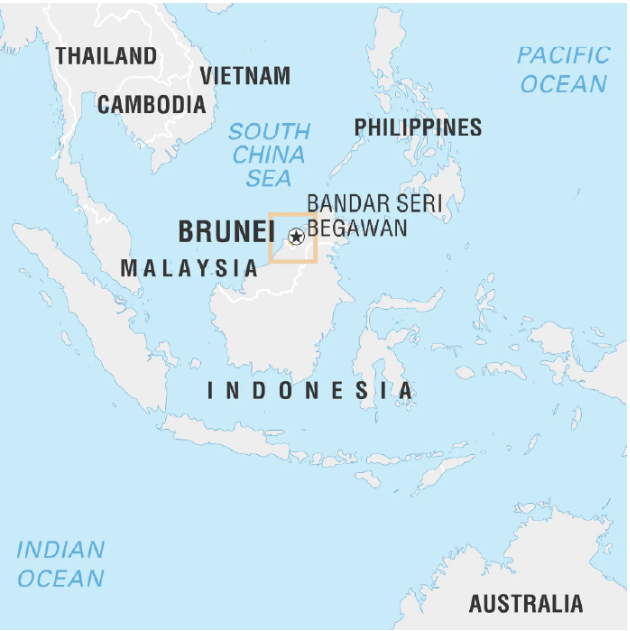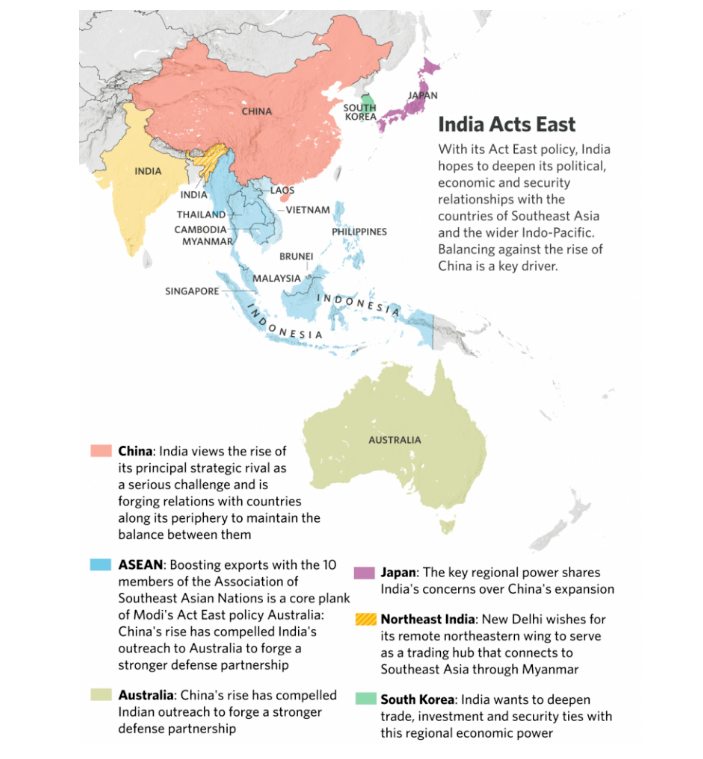Modi’s Landmark Visit to Brunei: Strengthening Defence and Strategic Ties Amid Indo-Pacific Tensions
(Source: Indian Express; Section: Govt & Politics; Page: 05)
| Topic: GS2 – International Relations – Bilateral Relations |
| Context: |
|
Analysis of News:

About Brunei Darussalam (Capital: Bandar Seri Begawan)
Political Features
- Location: Country in Southeast Asia consisting of two unconnected parts, situated on northern coast of island of Borneo.
- Border: Apart from northern coastline on South China Sea, it is completely surrounded by Malaysian state of Sarawak.
- It is a member of Commonwealth and ASEAN.
Geographical Features
- Landforms: Narrow coastal plain in north & rugged hills in south.
- Highest point: Pagon Peak
- Major rivers: Belait, Tutong, and Brunei, Pandaruan etc.
- Climate: Equatorial climate influenced by monsoon systems
Key Areas of Discussion
- Defence Collaboration: Talks included the potential establishment of a joint working group on defence cooperation. The existing defence relationship, governed by a Memorandum of Understanding (MoU) signed in 2016 and renewed in 2021, covers regular high-level exchanges, naval visits, training, joint exercises, and participation in each other’s exhibitions.
- Commercial and Cultural Ties: Modi’s visit aims to enhance commercial and cultural relations, reflecting the historical ties between the two nations. The Indian diaspora in Brunei, particularly in sectors like healthcare and education, plays a significant role in strengthening these bonds.
Strategic Importance of Brunei
- Role in Act East Policy: Brunei is a key partner in India’s “Act East” policy and Indo-Pacific vision, particularly as India marks a decade of the “Act East” policy. Brunei’s strategic location and its role in the South China Sea disputes make it a vital ally for India in countering China’s influence in the region.
- Space and Defence Cooperation: Brunei has supported India’s space program, hosting a Telemetry, Tracking, and Command station since 2000. This collaboration extends to defence, with regular naval exchanges and joint exercises underscoring the strategic partnership.
Historical Context
- Diplomatic Relations: The visit coincides with the 40th anniversary of diplomatic relations between India and Brunei. Sultan Haji Hassanal Bolkiah, the world’s longest-reigning monarch, has visited India four times, emphasizing the longstanding and warm relationship between the two nations.
Conclusion
- Modi’s visit to Brunei is a strategic move to deepen ties in defence, commerce, and culture amid rising tensions in the Indo-Pacific.
- The visit not only strengthens bilateral relations but also reinforces India’s commitment to its “Act East” policy and its broader Indo-Pacific strategy.
| What is Act East Policy? |
Aim: |
| Practice Question: Discuss the strategic importance of Brunei in India’s “Act East” policy and Indo-Pacific vision. How can deepening defence and cultural ties with Brunei help India counter China’s influence in the region? (250 words/15 m) |

